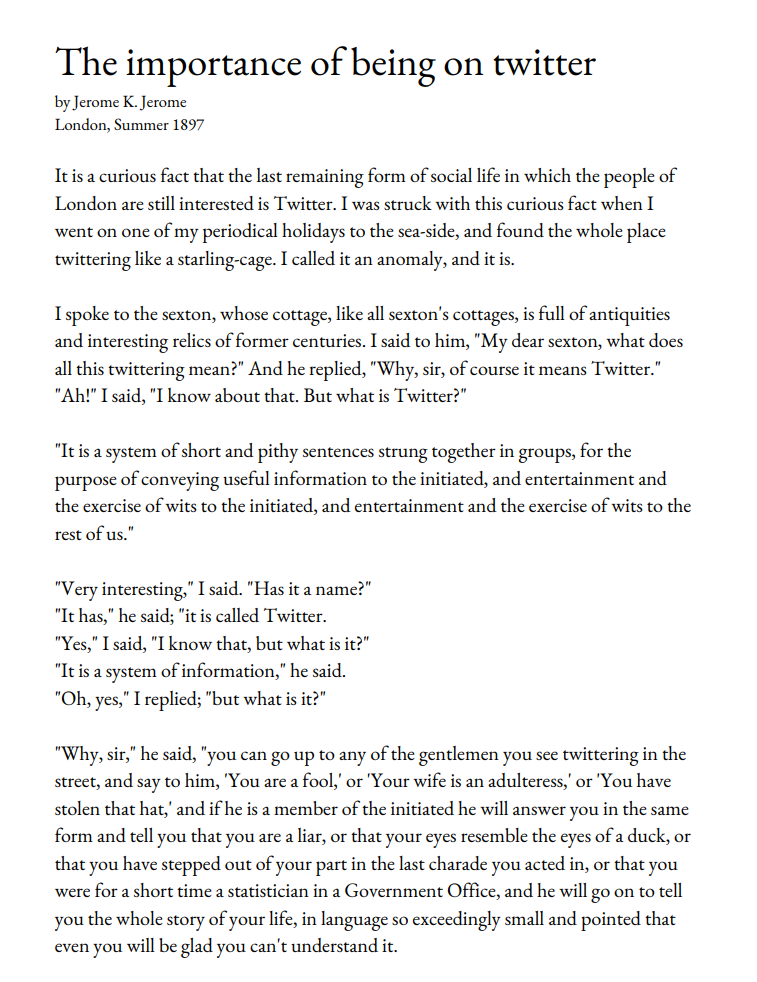The next wave of innovation? It’s here.

“How did you go bankrupt?” Bill asked.
“Two ways,” Mike said. “Gradually and then suddenly.”
~Ernest Hemingway
I’m sure many of you are familiar with Hemingway’s oft mis-attributed quote about financial calamity. I believe it also applies to change, particularly in technology, which tends to happen very slowly, and then all at once – at which point it impacts almost every facet of our existence (think steam engine, personal computer, smartphone etc).
Artificial Intelligence is a classic example. The phrase was coined as early as the mid 1950s and the first AI program, named the ‘General Problem Solver’ was born in 1957. There have been many ‘AI Winters’ since that time, where progress in the field has languished, but we are now – over 60 years after inception – on the cusp of a new technological revolution, that will be brought about by Open AI’s GPT-3, and similar technologies.
Consider the below text for a moment.

This was generated entirely by Mario Klingemann (@quasimondo on Twitter) using GPT-3 after simply feeding the name of the author (for writing style), the title (for subject) and the word ‘It’.
Now you may not be a Twitterer but the last paragraph made me laugh out loud multiple times, because, whilst farcical, it does accurately embody many Twitter user’s modes of communication. The writing obviously has some flaws, but overall is amusing, interesting and engaging.
GPT-3 – which is still in beta – has also been shown to be able to write code when given a description of a function, create web-page layouts from a text description and even write music. In layman’s terms, it does this by consuming all of the relevant data from the internet and effectively crowd-sourcing the answer using a massive amount of source data and filtering for quality using (I assume), historical rating systems that are available (such as reviews, upvotes, sales success etc). It is the principle of the ‘wisdom of the crowd’ but on a global scale and soon, anybody will be able to access that wisdom. That is what excites me.
The fiction above is fun, but not useful. Being able to generate well researched, intelligent reports on any topic at the drop of a hat, crowd-sourced from the best experts in the world – that is useful. Being able to code – and therefore iterate – much faster, is very useful. This kind of technology can quickly become an indispensable research assistant for anyone and everyone, an assistant that is an expert in every field that exists, and it will save a huge amount of that most precious commodity – time. With more time available, creativity can flourish and experimentation can be much cheaper. As with all great technologies, the single most important use of AI is in accelerating innovation by making it quicker, more accessible and cheaper – for humans.
Humans are, after all, the creative force behind the machines, and novel ideas always build on what came before; as Sir Isaac Newton pointed out, great advances are only possible by standing on the shoulders of the giants that precede us. GPT-3 is really just intelligent plagiarism of original – human – content, but it will allow us to climb onto those shoulders far faster.
Good, innovative work in any field takes time – first comes the learning, then the deep understanding, followed by desire and ability to create once a niche is spotted. It will often take decades to get to the depth of understanding necessary for the latter stages. The wealth of information available to us at the click of a button has greatly accelerated this process, and I believe technologies like GPT-3 will do so even further. This is something to be celebrated. Likewise, a noteworthy point is that GPT-3 will be usable by people of many different backgrounds, because using the technology (once a developer has adapted it to a use case) is as easy as asking it a question, or giving an instruction, in ordinary language. Endowing non-technical people with the ability to perform technical tasks may well spur unexpected innovation.
I’m hopeful that it will also raise the quality of content produced. After all, if an aspiring writer or financial analyst knows that well written, well researched content can be generated on any topic at a moment’s notice, they will undoubtedly feel pressure to be more insightful, dig deeper and look for the non-obvious. It’s very existence ultimately raises the bar for everyone.
As mentioned, this technology is still in beta, so my excitement may be somewhat premature, but there are already many fascinating examples of work being produced with it online, which I heartily recommend investigating. The world has no shortage of doom and gloom (especially at present), and no doubt the media will be full of apocalyptic stories about job destruction and the imminent extinction of the human race by robots once they cotton on to what is happening here, but tune out the noise, look for yourself and start thinking about how this kind of technology can improve how you work – because it absolutely will.

Author: Jos Evans, Founder and CEO Of AiX Exchange.
Follw him on LinkedIn
Further Information: https://www.aixtrade.com